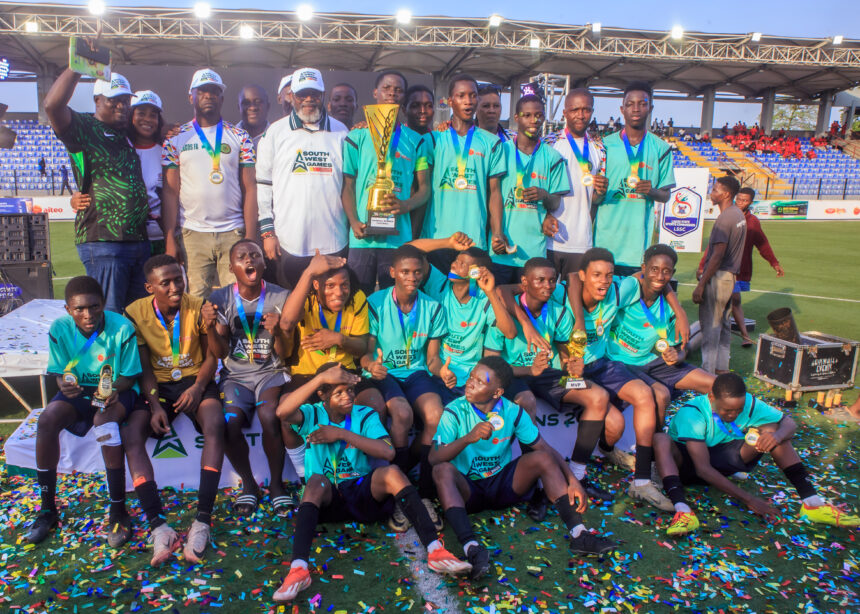● Grand Curtain Call: From Final Whistle to Ecstatic Closing Celebrations, Southwest Crowns Future Champions
● Sanwo-Olu, Abiodun, Otedola, Elumelu, Others Bag Honours
● A Timely Revolution: Birth Of a New Era In Grassroots Sports, Talent Discovery
March 28, 2025, the Onikan Stadium, nestled in the heart of Lagos Island, echoed with the roar of an ecstatic crowd, their voices cresting like the Atlantic waves over the sprawling cityscape. It was not just another evening at the stadium complex but the climax of the South West Games 2025, a fiesta that began with fervent anticipation and culminated in the crowning of champions. Standing like a coliseum of dreams, the stadium trembled with an energy so electric it seemed as though the entire city of Lagos pulsed in harmony with its fervor. From the towering floodlights that cast golden beams across the pitch to the sea of jubilant fans whose voices fused at a deafening crescendo, the tournament reached its apogee in an unforgettable closing ceremony—a kaleidoscope of pomp, passion, and sheer athletic brilliance.
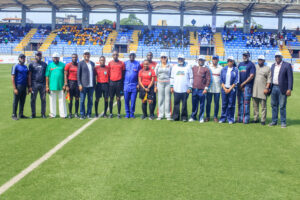
From the moment the sun kissed the Atlantic horizon to the final whistle that sealed history, Onikan Stadium became the pulsating heart of an unforgettable spectacle as the finest young athletes from across Nigeria’s southwest region stood at the precipice of destiny. The Games had been a festival of youthful exuberance, where under-18 athletes from across the six southwestern states—Osun, Ekiti, Ondo, Ogun, Lagos, and Oyo—showcased their raw and refined talents.
The air grew thick with enchantment as cultural troupes swirled onto the pitch, their attires ablaze with the hues of Yoruba heritage. The earth trembled beneath the thundering drums of the bata, the rhythms calling forth the spirits of ancestors who had once danced in similar revelry. The legendary Eyo Masquerades emerged, their regal white agbadas billowing, their staffs striking in rhythmic unison. They moved like celestial custodians of Lagos’ storied past, weaving tradition and sport into a concerto of splendor.
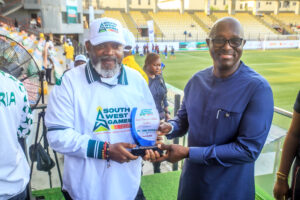
A Festival of Culture and Sport
At the first light of dawn, the city had braced itself for a spectacle unlike any other. The final day began as the city stretched awake, its heartbeat synchronized with the anticipation of a spectacle. By 10 a.m., the President of the Organising Committee, Dr. Lanre Alfred, led his team into the arena, their steps purposeful, their mission resolute. This was not merely a closing ceremony—it was the coronation of a new age of sports in Nigeria’s southwest. By 12 p.m., Alfred, led his team to the centre stage, setting the grand ceremony in motion. Then came the moment that sent the audience into a frenzy—the Director General (DG) of the Lagos State Sports Commission (LSSC), Lekan Fatodu, ascended the stage. The air quivered with spectator anticipation as he declared the closing ceremony open. A technocrat of great vision, Fatodu inaugurated the Games two days earlier – March 26. Since declaring the tournament open, he had remained a stalwart presence, championing the cause with unfaltering passion.
“This is the dawn of a new sporting renaissance,” he declared. “A movement that will redefine sports in Nigeria, unlocking a reservoir of talent and charting the course for a new generation of champions.” Fatodu hailed the tournament as a revolutionary initiative, a movement that had not only discovered talents but also redefined the landscape of youth sports development in the region.
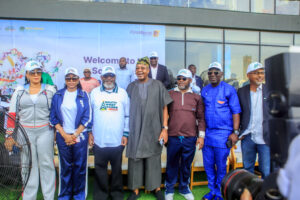
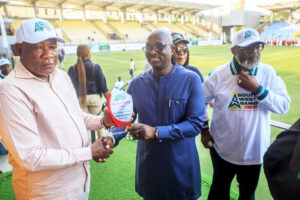
Fire that Lit the Night: The Great Finale
And then, the true magic began. The final match began as all great finales do—on a crescendo of skills, colours and sound. A whirlwind of fireworks erupted into the Lagos sky, painting the heavens with fiery streaks of crimson and gold, as if the very gods of Olympus had taken an interest in the spectacle unfolding below. The rhythmic heartbeat of bata drums surged through the stadium, blending with the triumphant cries of spectators who had lived and breathed every moment of the Games. The air itself seemed to vibrate with anticipation, charged with the invisible energy of dreams fulfilled and legends reborn.
At the heart of the night’s grandeur was the final contest—a high-stakes football battle between Lagos and Ekiti States. Every pass was a stanza in the poetry of the pitch, every tackle a fierce proclamation of desire, and every goal a thunderclap of destiny. The turf, glistening under the floodlights, became a battleground where young warriors wove magic with their feet, their movements a ballet of grace and power. Every sprint was a declaration of intent, every pass a whisper of strategy, every goal a resounding proclamation of dominance. The match was a theatre of skill and inexorable zeal, the ball moving like a comet between the boots of players who knew that this was more than just a game—it was history in motion.
Then came the moment of reckoning. A last-minute strike, a ball arcing through the air like an artist’s final brushstroke on a masterpiece, sent Lagos into rapturous delirium. The stadium erupted into cheers and tears, as the captain of the Lagos team hoisted the golden trophy skyward, his arms trembling with the sheer weight of victory and destiny.
Foremost Politician and Publisher of Ovation Magazine, Bashorun Dele Momodu (CFR), Chief Folly Coker, Zulu Authority, and Seyi Oyefeso who represented of the Managing Director (MD) of First Bank, Olusegun Alebiosu, presented the trophy to the overall winner of the tournament, Lagos State.
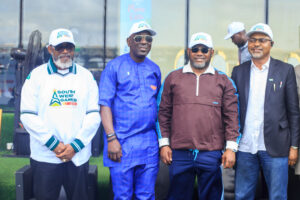
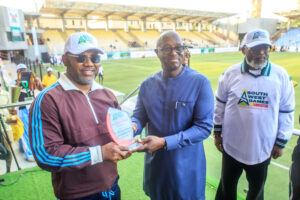
A Host State’s Crowning Glory: Lagos 1st, Ogun 2nd, Ondo 3rd
There is no gainsaying that the tournament heralded a showcase of talent, athleticism, and state pride, featuring fierce battles across multiple sports, and ultimately crowning Lagos as the overall champion, with Ogun and Ondo securing the second and third positions, respectively.
Lagos proved its dominance with outstanding performances, particularly in Table Tennis and Boxing. In table tennis, Lagos clinched 5 Gold, 2 Silver, and 0 Bronze medals, securing an emphatic 1st place. This unrelenting form continued in Boxing, where Lagos collected 4 Gold, 1 Silver, and 1 Bronze, further solidifying its supremacy in combat sports. The state’s prowess in individual events was unmatched, propelling them to the overall top spot.
Ogun showed its strength in Athletics and Volleyball, earning 1st place in both categories. The state amassed 3 Gold, 4 Silver, and 3 Bronze in athletics, finishing ahead of Ondo and Oyo. In Volleyball, Ogun’s solitary Gold medal was enough to clinch the top spot, demonstrating the state’s impressive versatility across both individual and team sports. These achievements firmly secured Ogun’s position as the 2nd overall best state in the competition.
Ondo delivered a consistent performance, securing podium finishes across multiple sports to emerge as the 3rd best state overall. Their most notable showing was in Athletics, where they won 3 Gold, 3 Silver, and 4 Bronze medals. Although Ondo matched Ogun’s overall tally of 10 medals, they were edged out due to a lower count of gold medals.
Meanwhile, Osun, Oyo, and Ekiti faced stiffer competition. Osun managed commendable performances, earning medals in Table Tennis, Athletics, and Boxing. Oyo stood out in Athletics and Volleyball, while Ekiti struggled to make a significant mark, finishing without medals in most events.
In the end, Lagos, Ogun, and Ondo proved to be the powerhouses of the region, setting the bar high for future competitions. Lagos, with its commanding performance, emerged the undisputed overall champion—thus affirming its dedication to sports development and excellence.
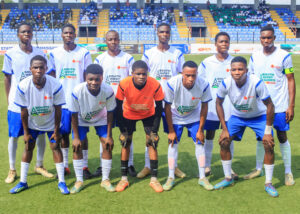
The Asiwaju Cake
At the height of the evening’s splendor, as the air thickened with the celebration of triumph, a moment of pure spectacle unfolded—the stadium lights dimmed for a fleeting second, causing a hush to ripple through the expectant crowd. Then, like a revelation, the Asiwaju Cake was unveiled—a towering confection of culinary artistry. Adorned in gold-leaf embellishments and the deep green hues of Nigeria’s pride, the cake stood as a majestic tribute, embodying the spirit of leadership, resilience, and unity that the Games had championed. The emblem of Lagos shimmered at its peak while intricate designs of sporting icons were etched into its tiers—a nod to the very essence of the tournament.
As the ceremonial knife was lifted, the crowd erupted in cheers, their voices a harmonious blend of excitement and reverence. The Director General of the Lagos State Sports Commission, Lekan Fatodu, Oyefeso, who represented First Bank’s MD, Olusegun Alebiosu, the President of the South West Games 2025, Lanre Alfred, flanked by dignitaries, athletes, and esteemed guests, guided the blade through the heart of the masterpiece. The first slice fell, and with it, a symbolic gesture of victory and shared triumph.
A rapturous applause cascaded from the stands, piercing the evening air, as cameras flashed in rapid succession, capturing the moment for eternity. Athletes, their sweat still fresh from the battlefield, beamed with unfiltered joy, their youthful faces aglow with the belief that they had been part of something greater than themselves.
The Asiwaju Cake was no doubt a worthy tribute, complimenting BATSWAG and manifesting as a sweet punctuation to a tournament that had shattered barriers and set a new dawn in motion. And as its rich flavors melted on the tongues of the champions and spectators alike, the night’s jubilant spirit soared even higher, carried by the laughter, music, and promise of a brighter tomorrow.
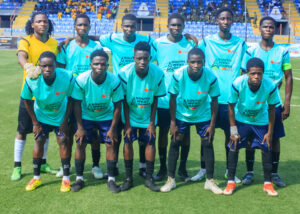
Rapture of Victory Well-Deserved
The roar of the crowd rolled like waves onto the streets beyond as Lagos City celebrated its emphatic win and reaffirmation of its place as the cradle of champions. The captain of the Lagos team lifted the shimmering trophy, his eyes ablaze with the fire of triumph. With hands trembling yet unyielding, the captain of the Lagos State team ascended the podium, the golden trophy gleaming under the floodlights. He lifted it high, his face a portrait of unfiltered elation. In that singular motion, he carried the dreams of every young athlete who had graced the tournament, their aspirations woven into the very fabric of victory. The stadium erupted in a single deafening roar of joy. From the terraces to the streets beyond, Lagos Island quaked with celebration, the echoes of victory rolling through the coastal belt and beyond.
As if the heavens themselves wished to bless the moment, a cooling breeze blew pleasantly across the stadium as the Nigeria Army Corps Band imbued the ceremony with greater colour, bellowing a grand orchestra of melody and rhythm. The stadium exploded in response—athletes, officials, and fans alike succumbed to the magnetic pull of the music, their bodies moving to an uncontainable beat. It was a moment frozen in time, a bridge between the past and the future, between culture and competition. Through the band’s spectacular performance, their brass and percussion instruments resounded with patriotic fervor, a fitting tribute to the champions who had written their names in gold.
There is no gainsaying the entire Lagos Island reverberated with the pulse of the games; the stadium towered like a lighthouse drawing spectators from all walks of life—sports enthusiasts, cultural aficionados, and dignitaries from across the nation. Corporate leaders, politicians, entertainers, and sports icons graced the event, their presence adding to the occasion’s grandeur. The Nigerian Army Band lent a majestic cadence to the ceremony, filling the air with stirring melodies.
Honouring Legends, Celebrating the Future
Yet, the night was not solely about competition. It was a homage to those whose vision and dedication had made the Games possible. One by one, the names of the honorees were called, each one stepping into the glow of recognition, their faces illuminated by both the floodlights and the admiration of the crowd.
Governor Babajide Sanwo-Olu, whose unwavering commitment to grassroots sports had set the foundation for this monumental event, was honoured as the Grand Patron of Sports Leadership & Excellence. His administration had not only provided the logistical backbone for the Games but had also pioneered key policies that ensured that young athletes in Lagos had access to world-class training and facilities. Under his stewardship, sports had become more than just recreation—it had become a vehicle for empowerment, a gateway to global recognition for young, talented Nigerians.
Senator Adeola Yayi CON was named the Champion of Grassroots Sports, a testament to his relentless advocacy for youth development through athletics. His initiatives had seen the construction of sports centers in underserved communities, providing a platform for hidden talents to rise from the fringes into the limelight of national and international sports. His name had become synonymous with transformation, a beacon for every young dreamer who had once played barefoot on dusty pitches but now stood on the cusp of glory.
Dr. Mike Adenuga Jr. GCON, CSG, Cdr L.H., a titan of industry and philanthropy, was recognized as the African Pillar of Sports, a fitting tribute to a man whose investments in Nigerian sports had reverberated across the continent. His vision extended beyond infrastructure; he had laid the groundwork for a culture where sports was not just an afterthought but a vital component of national development. His contributions had empowered athletes across disciplines, providing sponsorships, training facilities, and exposure that had catapulted many to global stardom. Bashorun Dele Momodu, who received the award on behalf of Adenuga, was equally honoured as the Custodian of Sports Heritage, a recognition of his tireless efforts in documenting and promoting the stories of Nigeria’s greatest sports icons. Through his work in journalism and media, he had ensured that the exploits of past and present champions would never be forgotten, that their names would be etched in the annals of history for generations to come.
Hon. Kunle Soname was named the Torchbearer of Sports Innovation, a title befitting a man whose pioneering efforts in sports business had changed the landscape of Nigerian athletics. From establishing professional football clubs to funding scholarships for emerging talents, his work had bridged the gap between aspiration and reality, proving that Nigerian sports could be both a passion and a viable industry.
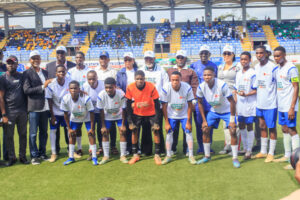
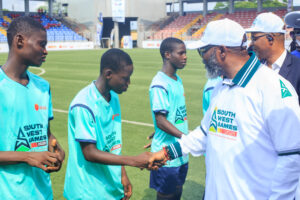
The list of awardees read like a who’s who of visionaries and champions—Governor Dapo Abiodun MFR, lauded as the Grand Patron of Southwest Sports; Dr. Awele Elumelu, a driving force behind sports health and wellness initiatives; Senator Tokunbo Abiru FCA, an advocate for youth engagement through sports; Nduka Obaigbena, whose media empire had consistently spotlighted the importance of Nigerian athletics; and governors Ademola Adeleke, Seyi Makinde, Lucky Aiyedatiwa, and Abiodun Oyebanji, each recognized for their contributions to fostering a sporting culture in their respective states.
But beyond the accolades, the night belonged to the athletes—the young men and women who had bled, fought, and conquered over the past two weeks. They had not only competed; they had told stories with their bodies, etched poetry into the fabric of the Games with their speed, their strength, and their unyielding will. They were the true heartbeat of the South West Games 2025, the embers that would ignite the future of Nigerian sports.
As the closing ceremony reached its peak, the stadium was once again transformed into a theatre of culture and heritage. The Eyo Masquerades, swathed in their ghostly white regalia, glided across the field like spirits from another realm, their staffs striking the earth in rhythmic unison with the pulse of the talking drums. The oriki chanters wove their lyrical magic, their voices rising and falling in ancient cadences that carried the weight of ancestry and triumph.
And then, the Army Band took the stage once again. Its rendition, raw and insistent, poured over the crowd like a river bursting through a dam, setting off a tidal wave of song and dance. At that moment, the South West Games was no longer just a sporting event. It had become something more—a movement, a legacy, a living, breathing testament to the unbreakable spirit of the Southwest.
As the final fireworks illuminated the evening sky, their reflections dancing upon the waters of the Atlantic, amid the pageant, Dr. Alfred stood before the roaring crowd, his eyes ablaze with the fire of a man who had seen his vision come to life. “This dream does not end here,” he declared. “Preparations for the next edition have already begun. The South West Games is here to stay—year after year, we will continue to unearth and nurture the finest athletes Nigeria has to offer.”
The echoes of his words carried far beyond the stadium, beyond Lagos, beyond the moment. The Games had ended, but their legacy had only just begun. Across football, volleyball, basketball, tennis, boxing, and archery, young gladiators clashed in an arena of dreams, leaving everything on the field. Some met the ecstasy of victory, their names now etched in the annals of history; others bore the agony of near triumph, their tears an unspoken promise to return stronger. A revolutionary beagle had been sounded, a promise incised into the heart of the southwest and Nigerian sports—that from these Games, from this movement, new champions would rise.


